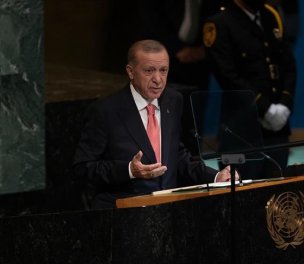Türkiye working to resolve hostage crisis between Russia, Ukraine, says Erdoğan

Photo: AA
Türkiye is working to resolve a hostage crisis between Russia and Ukraine to deescalate tensions between the two countries, said President Recep Tayyip Erdoğan has said.
"We are now working to resolve the hostage crisis. We are taking steps and we have reached a certain point. On the other hand, we took the steps regarding the grain corridor," Erdoğan said in an interview with US TV show PBS NewsHour aired yesterday (September 19).
Following a two-day visit to Uzbekistan, Erdoğan is currently in New York City to attend the 77th session of the UN General Assembly and is holding talks on the sidelines with heads of state and government.
"I had extensive meetings with (Russia's President Vladimir) Putin in Uzbekistan. I realized that they are actually trying to finish this as soon as possible. This situation is a big problem.
"At this point, for example, an agreement has been reached on the exchange of 200 hostages. This is a good development. Because with these hostages, a very important step has been taken there. Currently, officials are managing its technical dimension."
CLICK - Erdoğan visits Ukraine: 'War will end at negotiating table'
CLICK - Türkiye has received highest share of foodstuff exported from Ukraine since grain deal
Erdoğan stressed that he has told both Putin and his counterpart in Ukraine, Volodymyr Zelenskyy, that "there is no winner in a war that ends in the deaths of people."
The president said that Türkiye has followed a balanced policy between Russia and Ukraine since the war started in February and favors listening to both sides.
"That's why we have a persistent desire to bring these leaders together. Let's bring them together. I want to hear everything from them. We haven't succeeded yet, but I'm not without hope," he added.
The F-16 issue
Responding to a question on bilateral relations with the US, Erdoğan said, "I can't say it is at an ideal point."
Regarding the F-16 fighter jets issue between the two countries, Erdoğan said the US is doing "wrong" to a friendly country by taking a political decision against Türkiye.
Ankara requested the F-16s and modernization kits last October. The $6 billion deal would include the sale of 40 F-16 jets and modernization kits for 79 warplanes that the Türkiye's Air Force has in its inventory.
In July, however, the US House of Representatives approved legislation creating a new hurdle for the sale.
It prohibits the sale unless President Joe Biden certifies that the transfer is in US national interests and guarantees to Congress that in the 120 days prior to the transfer, the Turkish government has not "violated the sovereignty of Greece, including through territorial overflights."
Türkiye, for its part, has made it clear that Greece-related conditions are not "binding" and expressed hope that the US would not fall for such "games."
Erdoğan also criticized the US for giving all kinds of support to Greece for F-16 jets but not supporting Türkiye in this regard.
"In this case, Türkiye's job is to take care of itself. Otherwise, we don't have a problem with America," he added.
Meanwhile, Erdoğan held a closed-door meeting Monday with US Senator Lindsey Graham, who previously said that he supports the Biden administration's decision to sell F-16 fighter jets to Türkiye.
Shanghai Cooperation Organization
On Türkiye's possible membership in the Shanghai Cooperation Organization (SCO), Erdoğan said, "I have to say this very clearly: We are part of the world; neither East nor West."
After attending this year's SCO summit in Uzbekistan as a dialogue partner, Türkiye might take a further step at the 2023 summit in India, he said, adding Ankara "targets" membership.
"Unfortunately, the EU has not made us a member for 52 years. There is no other country in the EU that is in our situation. They still keep stalling the process. However, we are a NATO country. Even though we are a NATO country, even NATO countries keep us busy in the EU process," he added.
Türkiye applied for EU membership in 1987 and has been a candidate country since 1999. Negotiations for full membership started in October 2005 but have stalled in recent years due to political hurdles erected by some countries. (VK)




.jpg)
sa.jpg)
